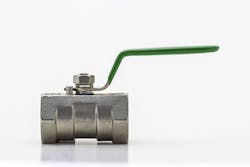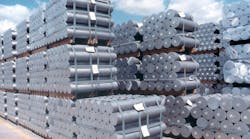The global petrochemical industry, over any reasonable period of time, evolves — and even migrates from place to place. Yet even amidst constant and significant change, the petro-chemical and other heavy industries, as well, continue to rely on forged-steel ball valves.
That’s not likely to change, moreover, because even today forged-steel ball-valve quality is still improving.
As is well known, a ball valve is a form of quarter-turn valve using a hollow, perforated and pivoting ball (called a "floating ball") to control flow through it. The valve is opened and closed by pressure on the ball, which fits into a cup-shaped opening.
A cogent example
Take, for example, a recent series of ball valves that includes special extended-socket ends to dissipate heat during welding. Without the need to dis-assemble the valves, less time is spent welding during installation. The socket weld ends are compliant with ANSI B 16.11 and EN 12760 standards.
The forged-steel body meets the 2500/6000 pressure-class rating requirements. And the valve and body end-caps are good for low-temperature applications. Zero leakage on these valves is achieved with body O-rings and double joint gaskets. Placing the body O-rings ahead of the body cap threads means the seal is tight and it protects the threads.
With these valves, a "vented ball" is standard, to equalize pressure between the body cavity and the flow stream, preventing seat damage due to thermal cycling. These valves are also fully compliant with ASME/ANSI B16.34.
Inevitable specifications
Available in both full-port and standard-port, these valves come with an ISO 5211 mounting pad and are tested to API 598. They also have pressure-equalizing seats and bottom-loaded blow-out-proof stems. Gland bolts allow for easy packing-adjustment without having to remove the handle.
Bob Donnelly is vice president of marketing, Flo-Tite Valve & Controls.


